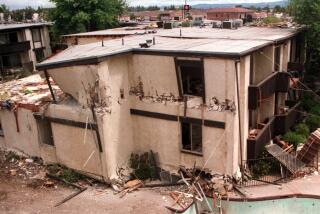A sorrowful ritual in war
The door of the charter plane lifted, and an honor guard in dress blues strode crisply across the tarmac at Palmdale Regional Airport. The only sounds were the occasional cry of crows, the flapping of American flags held straight up and the low sighs of a mother trying to keep from sobbing.
Out came the flag-draped, dove-gray casket.
Variations on this scene have played out more than 4,000 times, each time an American service person has been killed in Iraq.
They gathered at 11:10 a.m. Tuesday for Army Pfc. George Delgado, 21, who died with three other soldiers March 24. The killings brought the number of American deaths in Iraq to 4,000. The toll now stands at 4,012.
Capt. Luis Juarez offered his right arm to Delgado’s mother, Maria Calle, who hid swollen eyes behind large brown sunglasses. Calle took the officer’s arm and turned to her 19-year-old daughter, Cynthia Delgado. Mija, she said quietly. My daughter.
They walked slowly together toward the casket, trailed by Calle’s sisters and brothers. Delgado’s father, Elias Delgado, divorced from Calle 18 years ago, followed.
Each family member was lost in his or her own grief. Elias Delgado kept his left arm stiffly tucked behind his back and put only his right hand on a corner of the casket. Calle laid her cheek on the flag and caressed the top in long, slow strokes. One of her sisters whispered basta -- enough.
The honor guard slipped the casket into a white hearse. When the door closed, Calle and her brothers and sisters drifted away. Elias and Cynthia Delgado lingered behind. He finally moved his left arm to put it around his daughter. It was only then, when they were alone with his son’s body, that he began to cry.
Each serviceman or woman’s story is unique, but certain rituals occur again and again as families grieve and bury their dead. It was just as quiet at the Long Beach Airport in January, when the family and friends of Army Sgt. David J. Hart, 22, of Lake View Terrace gathered for the arrival of his casket. Among the few sounds: another mother weeping.
Members of Patriot Guard Riders -- motorcycle enthusiasts who pay tribute to fallen U.S. military personnel -- greeted Hart’s coffin and showed up in Palmdale as well, riding in front of the hearse with American and Army flags flying on their motorcycles.
The long train of cars following the hearse made its way slowly across the high desert, and at 12:20 p.m. the procession passed Desert Christian High School. More than 100 students and teachers lined the curb, hands over their hearts. They held small American flags and hand-painted signs that read, “George Delgado” and “Class of 04.”
This scene too has played out elsewhere.
Children and adults lined the streets of Torrance last June as a horse-drawn carriage carried the coffin of Army Pfc. Joseph J. Anzack Jr., 20.
When the body of Army Spc. Wayne M. Geiger, 23, was brought back to the Owens Valley town of Lone Pine in October, more than 2,000 people lined up along a desolate stretch of U.S. Highway 395.
As Delgado’s procession passed Desert Christian, Calle, riding in a slate-gray Chevrolet Cobalt driven by Capt. Juarez, nodded at the students.
--
One of four killed
The honor guard placed the casket on a blue dais in a dimly lighted room at Halley-Olsen-Murphy Memorial Chapel in Lancaster. Stepping away from the private wake, the parents spoke about their son.
Both had been upset that he joined the military. Elias Delgado, 52, asked his son to work with him at his dance studio in Downey. Calle reminded him that he was taking classes at Antelope Valley College and working at Wal-Mart; he had a chance to get somewhere in life without the Army.
Last spring, Delgado joined anyway, and in November he shipped out for Iraq from Ft. Stewart, Ga..
The Bradley fighting vehicle Delgado was driving was hit by a roadside bomb Easter Sunday in Baghdad. He died the next day, along with Staff Sgt. Christopher M. Hake, 26, of Enid, Okla.; Pfc. Andrew J. Habsieger, 22, of Festus, Mo.; and Spc. Jose A. Rubio Hernandez, 24, of Mission, Texas.
George Delgado’s friends from high school remember him as a young man who always wanted to help others, who always wanted to teach.
“That was huge in his life,” said Devin Thomas, dean of discipline and incoming principal at Desert Christian. “He was very inquisitive about the process, about what it took to become a teacher.”
Thomas said Delgado regularly visited the campus after his graduation and asked to sit in on Thomas’ Bible classes to observe the teacher in action.
Kathy Samudio, a high-school pal, had kept in touch by e-mail and instant messages while he was in Iraq. She said Delgado rarely spoke in detail about his experiences. Instead, she said, “he wanted to know how I was doing.”
Delgado’s family said he found a new sense of direction after he arrived in Iraq.
“He felt more useful,” Elias Delgado said. His son had talked about life after the Army. Perhaps, Delgado suggested, he could work as a police officer while he figured out how to become a teacher. He also talked to his sister about adopting a girl from Iraq because he saw so many orphans there.
In March he wrote his father a letter. Outside the funeral home, Elias Delgado pulled a torn envelope from his pocket and unfolded the one-page note. In a jaunty hand, Delgado said he was writing from inside a Bradley.
“It’s safe over here, which means boring, so that’s a good thing.” He told his father he planned to return home next February. “If we are lucky then we might go home sooner. Not holding my breath, though.”
The letter arrived at his father’s Downey office March 24, the day George died.
Military personnel notified Calle of her son’s death the next day. Before they could reach the father, one of Elias Delgado’s sisters called to say George had died. She happened to learn the news because she lived next door to the father’s old apartment, where the military unsuccessfully tried to find him. He didn’t believe her until the Army finally contacted him too.
Later that day, Calle also received a letter from her son. He wanted to have a barbecue when he came home, he wrote. He promised to send a list of friends to invite.
--
What words?
Inside the chapel, Calle sat in the first pew, along with her 77-year-old mother, Isabel Zanabria. Two flickering red candles flanked the casket. No one got up to speak at the wooden lectern.
Calle, 43, said she never thought her son would come back to her this way. She said she kept asking the Army to do tests to make sure they had identified the body correctly.
Calle never used to know what to say when she met someone who had lost a child. Now that she has lost George, she knows “it’s something you never want to feel.”
She turned her eyes to the ceiling.
“I know he is resting in peace,” she said, almost to herself. “He is not suffering anymore.”
The family headed back to Calle’s Spanish-style house in Palmdale at 4 p.m. Some aunts split off to bring back food from El Pollo Loco. They hadn’t eaten all day.
Cynthia Delgado led the way upstairs to her brother’s room, where an Army sticker was the only decoration on the door. Calle had straightened up the room since her son had left, but his Youthwalk Devotional Bible still lay on the desk. The Xbox was still plugged into the television.
Calle usually locked the door to George’s room when he was away, she said. “After all this, I’m just going to leave it open,” she said.
Since her brother’s death, Cynthia Delgado has been sleeping in his room. The night of the wake, his grandmother joined her. They fell asleep clinging to each other.
--
A tragedy’s final act
The memorial service at Desert Vineyard Christian Fellowship took place Thursday. George Delgado was buried at Riverside National Cemetery, as were some other casualties of the Iraq war.
--
jia-rui.chong@latimes.com ann.simmons@latimes.com
More to Read
Sign up for Essential California
The most important California stories and recommendations in your inbox every morning.
You may occasionally receive promotional content from the Los Angeles Times.










